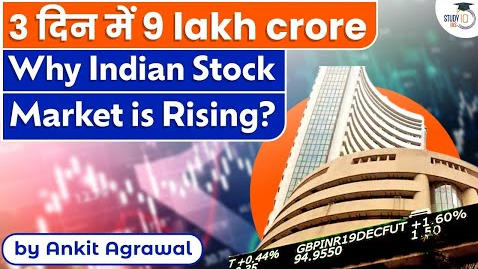Table of Contents

What has happened?
- Investors turned wealthier by more than ₹9 lakh crore, as the bulls reigned on the Indian stock markets in three days.
- The 30-share BSE benchmark Sensex jumped 712.46 points or 1.25% to settle at 57,570.25 on Friday, the highest level in over three months,
- Led by strong buying support in metal, banking and energy stocks.
- This is the third consecutive day of the rally in the equities markets.
- The Sensex had gained 1041.47 points or 1.87% yesterday. In three days, the benchmark has climbed 2,301.76 points or 4.16%.
- The continuation of the uptrend has added ₹9,03,574.58 crore to the market capitalisation of BSE-listed firms, which now stands at ₹2,66,58,604.02 crore.

- While this has lifted overall investor sentiment, experts say that since concerns remain around inflation, geopolitical risks and recession fears amid aggressive tightening by central banks (including in the US),
- The equity markets may continue to be volatile in the near term, and investors should not venture into them for quick, short-term gains.
Why has it risen?
- Thursday’s 1,000-point rally came even as the US Federal Reserve announced a 75-basis-point hike in interest rates on Wednesday.
- The markets took this positively, having anticipated a possible hike of 100 bps a week ago.
- Indian markets have performed better over the last one month as oil prices softened on account of recession fears in the US and lower growth expectations in China.
- Fund outflow by foreign portfolio investors from Indian equities — an aggregate of Rs 2.55 lakh crore between October 2021 and June 2022 (a monthly average of Rs 28,431 crore) — Reduced in July to only Rs 1,462 crore, providing stability to the markets.
reports
- A report by Credit Suisse noted that while developed market equities ticked higher on scaled-back expectations of rate hikes, emerging markets declined following recession fears, except India,
- “Which benefited from improved sentiment following a fall in oil prices”.
- “We are less concerned about India’s macro fundamentals, but more about global headwinds, which could weigh on equity markets in the near term.
- Nevertheless, our medium-term outlook for Indian equities is still positive, and any sharp corrections could be a good buying opportunity,” said the report.
- Another factor is an improved outlook on inflation and expected rate hikes.
- A report by Bank of Baroda noted, “Aggressive rate hikes by Fed are feeding expectations that the RBI may also front load its rate hikes.
- However, conditions in India do not warrant an aggressive stance by RBI.
- This is because domestic inflationary pressures have shown signs of stabilization… Further, risks to the inflation outlook have subsided…
- Hence, we expect that RBI may hike rates by only 25bps in Aug’22, followed by another 25bps rate hikes in the next two meetings.”
How has Indian market performed compared to others?
- Over the last six weeks, the Sensex with a return of 10.5% has been one of the best performers among key indices across the world.
- The Dow Jones Industrial in the US and Nikkei 225 in Japan come closest with returns of 7% and 7.1% respectively.
- In fact Shanghai Composite in China and Hang Seng in Hong Kong have generated negative returns of –1% and –2.1% respectively.
- Sectorally, capital goods, consumer durables, FMCG, Banking and auto indices at BSE have risen between 14% and 17% over the last six weeks,
- While indices such as IT, healthcare, metal and oil & gas have seen lower growth, between 6% and 9%.
What next?
- Brent crude prices, which were hovering over $110 per barrel a month ago, came down to under $100 last week.
- This has come as a big comfort for the Indian economy, which depends mostly on imports for its energy requirements.
- While Brent crude is currently trading at around $103 per barrel, experts feel that fears of recession in the US and lower growth in China may keep oil prices under check even as the geopolitical risks remain.
- Softening in global crude oil prices has also led to a decline in inflation expectations.
- But it is not as if all concerns have gone.
- The sharp rise in interest rates following the rate hikes by the Reserve Bank of India not only poses a threat to demand in the economy,
- but could also dampen earnings growth for companies over the next couple of quarters.
Should you invest for short-term?
- As markets may remain volatile, experts feel investors should not enter the market to benefit from the current rise.
- “There are multiple factors at play in the markets at this time and the markets can go either way depending upon the factor at play.
- One should only enter the market with at least a three-year horizon as this is not the market for short-term gains,” said the CEO of a mutual fund.
- “Geopolitical risks and recession fears amid aggressive tightening by major central banks are key headwinds that could lead to heightened volatility in the near term.
- Against this backdrop, some caution and risk management are warranted as India’s valuation premium is still elevated.
- Thus, we would remain defensive in the near term and prefer companies with high domestic exposure,” the Credit Suisse report said.
Q) As a part of financial sector reforms, the Reserve Bank has deregulated interest rates on which of the following?
- All Bank deposits
- All Bank deposits, other than savings bank deposits
- All Bank deposits, other than Current Account deposits
- All Bank deposits, other than Fixed Deposits
Latest Burning Issues | Free PDF






















 WhatsApp
WhatsApp